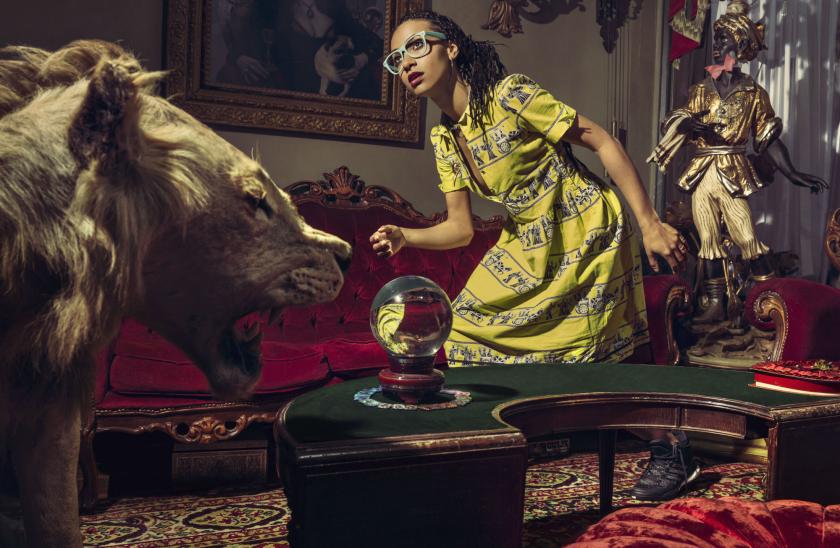Until last night, critics had a clear view of Esperanza Spalding as the virtuosic jazz bassist and singer, whose prodigious composing, performing and bandleading made her one of a small and precious group capable of re-making serious and popular jazz. In a rare moment of triumphalism, jazz critics love nothing more than recalling the fury of Justin Bieber fans, whom Spalding beat to the Best New Artist Grammy in 2011. Best get that story out the way before we go any further.
Last night, however, she redefined her career with Emily’s D+Evolution, an extraordinary, zany multi-form experimental project comprising theatre, poetry and music, based on her own theories of free-form, decentralised (“devolution”) education. The idea came to her, apparently, in the middle of the night, during a full moon. Emily, her middle name, is supposed to represent her inner child, while the concepts explored in the show celebrate the intuition and instinct with which a child learns. It may surprise fans of her over-achieving career that she wasn’t an automatic A-grade student at school, and her recollections of this motivate much of her enquiry. An album of the project is already recorded and will be released, unusually, after her extensive global tour is complete.
Emily D+Evolution has strong echoes of Seventies bands such as Weather Report
Musically, it’s very different from her existing work. It’s not – shockingly for some – mainly jazz, though there are extended, improvised dialogues between Spalding, guitarist Matthew Stevens and drummer Justin Tyson that would make John McLaughlin proud. The centre of proceedings is a rock power trio, consisting of these three, with Corey King and Emily Elbert providing supporting vocals, and electronica and acoustic guitar, respectively. Spalding herself was on superb form, switching effortlessly between four-string Fender jazz bass, to her five-string fretless, singing in her unmistakeably pure-toned, agile voice, and sometimes playing keyboards too.
Spalding has spoken at length in interviews about the theatrical elements of this project, but on the evidence of last night, the relationship between music and lyrics are the show’s most interesting feature. “Ebony and Ivy”, for example, which alludes to a recent American study of how Ivy League universities depended on slavery for their development, began with a group declamation of poetry read from mock-academic scrolls. It was very difficult to make out the lyrics in the hall, however, and the visual theatrical protest lacked the subtlety of the music or literary concept.
“Noble Nobles” sought to explore the positive features of the noble savage, though again, the music and lyrics approached the topic with much more complexity than Spalding’s floral headdress, which had a touch of pantomime about it. This was also the case, for me, with the musical excerpts of Elgar’s Pomp and Circumstance March No 1, which began “Ebony and Ivy”. Spalding's allusiveness took a lighter form elsewhere, for example, with “Hello Dolly”. To approach such big themes with a multi-faceted project that strives for satirical effect as well as more delicate forms of engagement is an ambitious task requiring further refinement to avoid cartoonish gestures. The attempt was highly invigorating.
 In embracing the character of Emily, Spalding has created an extravagant appearance (pictured right), with tight braids replacing her trademark ‘fro, and aquamarine nerd glasses to complement the educational parody of many of these songs. In style and purpose, Emily D+Evolution has strong echoes of Seventies bands classed broadly as jazz fusion, such as Weather Report, The Mahavishnu Orchestra and Miles Davis’ range of electronic outfits. The engagement with intriguing, sometimes outlandish ideas from education and philosophy helps here too. In the stridency and vividness of her (ever so slightly sloganising) declamations in “Funk the Fear” among other tracks, there was, at times, a sense that Spalding had created her Emily alter-ego as an escape from a rather over-programmed, over-scripted jazz career.
In embracing the character of Emily, Spalding has created an extravagant appearance (pictured right), with tight braids replacing her trademark ‘fro, and aquamarine nerd glasses to complement the educational parody of many of these songs. In style and purpose, Emily D+Evolution has strong echoes of Seventies bands classed broadly as jazz fusion, such as Weather Report, The Mahavishnu Orchestra and Miles Davis’ range of electronic outfits. The engagement with intriguing, sometimes outlandish ideas from education and philosophy helps here too. In the stridency and vividness of her (ever so slightly sloganising) declamations in “Funk the Fear” among other tracks, there was, at times, a sense that Spalding had created her Emily alter-ego as an escape from a rather over-programmed, over-scripted jazz career.
The openness and excitement of her experimentation (as well as the virtuosity of the playing) made the project a thrilling evening’s entertainment. Some features were perhaps striving too hard for effect. A project like this is much better to try too hard at than not hard enough, however, and lovers of experimental music will celebrate Spalding’s emergence as Emily, and look forward to the next chapter in her d+evolution.















Add comment